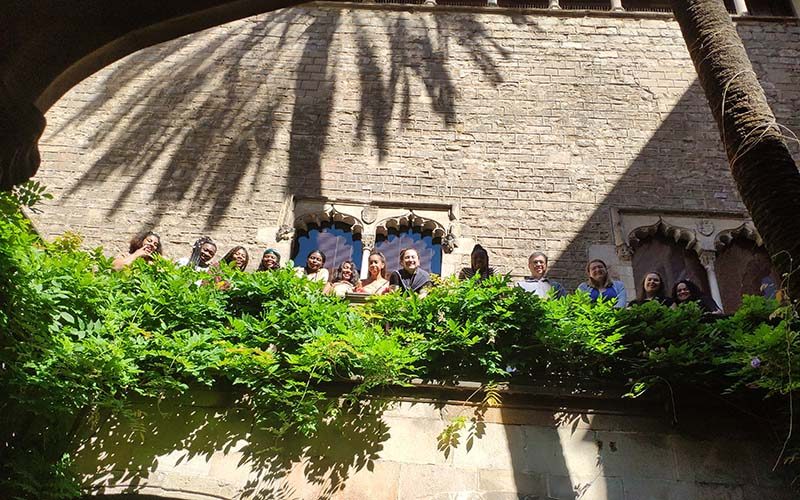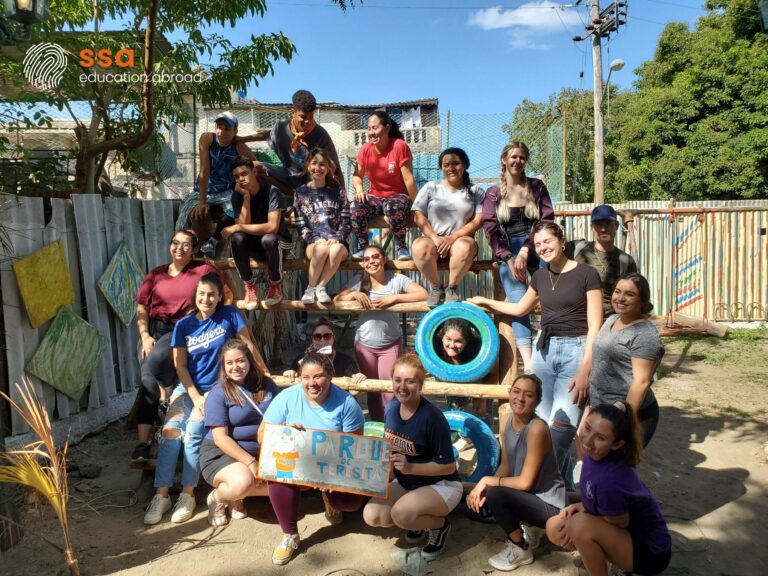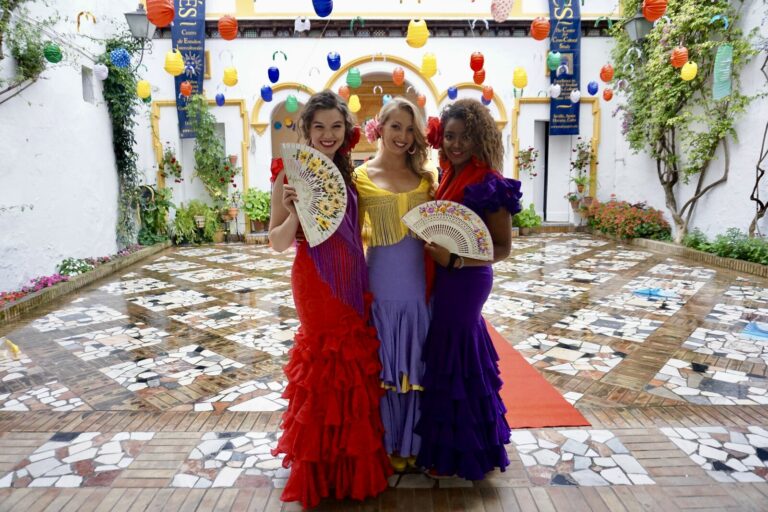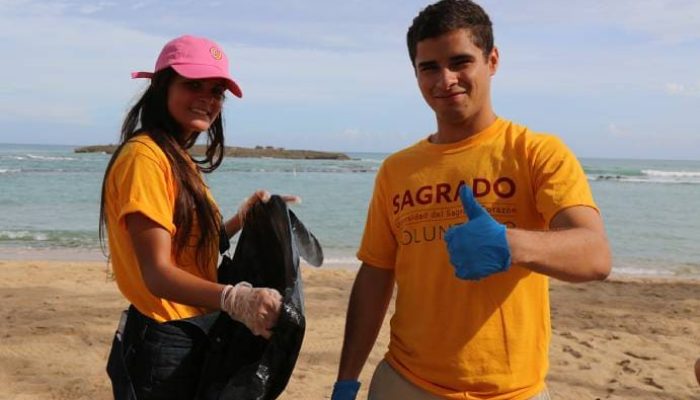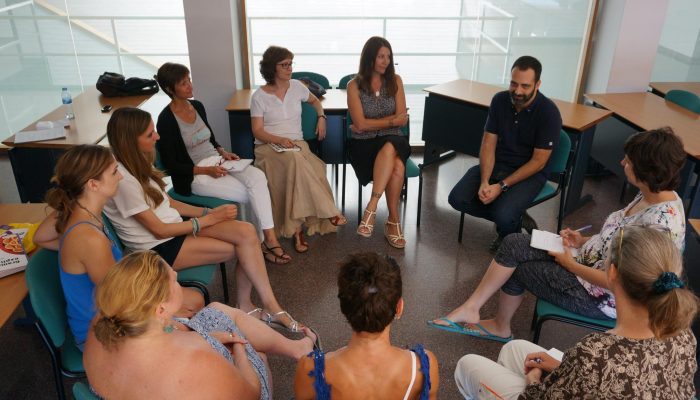Studying abroad in Barcelona is one of the unique experiences that a student can have. It’s Europe. It’s the Mediterranean. It’s Spain. It’s cosmopolitan. It’s artsy. And it’s a lot of FUN.
Barcelona has such a distinct combination of characteristics that visitors love it. And it might be the right choice for YOU.
Just how many Americans study abroad in Barcelona every year?
We’re not quite sure because it fluctuates. We know that Barcelona seems to be the most popular destination in Spain for American students, based on universities’ feedback.
It’s certainly the case for students seeking coursework in English. But the statistics available track by country, not by city. We estimate that there were around 2,000 to 4,000 American students in Barcelona in recent years during a given semester.
Here are some insider tips to get you ready to enjoy your time there. Or maybe they can help you decide if Barcelona is the type of destination that you seek.
- Alternative article: Studying abroad in Spain tips
- Alternative article: Why study Spanish abroad in Spain?
- Alternative article: Should I study abroad?
- Want to study abroad in English? Check out our 13 top places
Studying Abroad in Barcelona Tips

What’s it like to study abroad in Barcelona?
In recent years, Barcelona has been the top destination for American students in Spain due to the city’s global image for art, culture, atmosphere, a Mediterranean lifestyle, and great food. Students are drawn to this lifestyle as well as to the variety of excellent educational institutions.
What do Americans study abroad in Barcelona?
Most students from the USA take study abroad semesters or short summer programs. These are typically taught in English and can range from STEM classes to Humanities, Business, and Social Sciences.
There has been a growth of private, English-medium colleges that teach full degrees in Business, Hospitality, and Tourism in recent decades. They draw students from other countries as well as from Spain.
Where do Americans study abroad in Barcelona?
Most American students in Barcelona are there for a semester program or a short-term program in the summer, but almost always for university credits. Two universities that are attractive to international students are the Universitat Autònoma de Barcelona (UAB) and the Universitat Pompeu Fabra (UPF or “Pompeu), both of which figure among the top universities in Spain for international students. These two universities have study abroad programs with content courses in English and lessons to improve your Spanish fluency.
Others take courses in Design and Art at Elisava, a design school located right on the Rambla. Elisava offers study abroad programs entirely in English.
Students seeking full degrees can check out Barcelona’s Business colleges and Hospitality schools.
What to pack for study abroad in Barcelona?
Barcelona is an urban area, and people move around by public transport and by walking. Take good shoes for urban walking!
Think ahead on things like prescription medication – try to take all that you need and a bit more for your study abroad program. If you use less-common grooming products, you may wish to pack these as well. Of course, all essential toiletry items are easy to find in Western Europe.
We recommend that you buy a few adapters ahead of time to make sure you can recharge your laptop, phone, and any other electronic devices.
Regarding clothing, check the average monthly temperatures for the time that you will be there. Barcelona has a Mediterranean climate, but there are cold and rainy days some months. And summers are hot, with air conditioning less common, and certainly not set to such low temperatures as in the USA.
If you plan to exercise, take a few of those types of outfits. Generally, this type of clothing is lower priced in the USA. It’s also worth considering taking something like a lightweight suspension trainer as it means you can get a good workout no matter where you travel to.
Styles vary in the diverse and cosmopolitan city of Barcelona. On a hot summer day, people might dress elegantly or casually – such as jeans (or shorts) and a t-shirt. University students don’t dress so differently from their American counterparts. Some of their brands are different, and they may wear less sports gear, but students in Catalonia typically wear jeans with a t-shirt, sweatshirt, or sweater, which would not look out-of-place on a US campus.
If you wish to blend in a bit more with your clothing choices, prepare to be a little more formal and avoid “loud” symbols of your background, such as college sweatshirts or American flags. But Barcelona has an open mind about such things – you can dress how you want.
How to get a visa to study abroad in Barcelona?
For programs under 90 days, North Americans do not need a visa to study abroad in Spain. If your program is longer than 90 days, you will need to obtain a visa before departure from North America.
Spanish Studies Abroad assists its students in getting a visa at the Spanish consulate in their region.
In what language do they study?
In general, the big providers such as UAB and UPF teach their courses to international students in English. For more advanced Spanish students, each has some coursework in that language, including intensive language study. Their local students tend to take classes in the local language, Catalán.
Learning Spanish in Spain – or anywhere for that matter – is going to be hard, but with the right preparation you can make the most of your time and come back speaking excellent Spanish.
What’s the whole Catalonia-Spain issue?
Catalonia is the region where Barcelona is located and has its own cultural traits, language (not a dialect of Castilian Spanish), and history. Historically there has been a lot of tension between Catalonia and the central government in Spain, which has grown worse in recent years. The region already has a parliament and a great deal of autonomy from the government in Madrid.
Many – and in recent years, this seems to be a majority – of the region’s residents wish for full independence, which can sometimes mean periods of protests and general strikes. Madrid’s government will not approve a legal referendum to measure formal opinion, which has added to the tensions in recent years. But on a day-to-day basis, there typically is not much that is noticeable to students.
In 2018 and 2019, Spanish Studies Abroad students in Barcelona found the political demonstrations fascinating and a key takeaway.
What’s the architecture like in Barcelona?

Barcelona radiates style, design, and art and can rightfully be called one of the world’s most stylish cities. A walk along just about any street, and you see beautiful architectural details all around. The styles can vary from very classic European to Barcelona’s famous modernist architecture, made famous by artists such as Gaudí.
Is Summer study abroad in Barcelona a thing?
Yes, without a doubt. Students whose degree programs don’t allow for a full semester often use the summer to do a month or two in this beautiful Mediterranean city. Usually, local students take courses in English in the summer and make for significant intercultural interaction.
Barcelona is on the Mediterranean coast, so students love access to the beaches in the summer. Plus there are many outdoor activities to take advantage of such as festivals and concerts.
Talk to me about siestas…
We are sure that many people in Barcelona would love to have time for a siesta, but it is not so common here. It is more associated with the South of Spain as well as smaller cities where people have time. So you may find some people that do take a post-lunch nap, but it is probably the exception in Barcelona. Many don’t even have time to return for lunch the way they used to.
Do I get student discounts?
Most programs – including Spanish Studies Abroad’s university partners – provide a student ID card that you can use to get discounts at many establishments such as cinemas, theaters, gyms, and barbers/hairstylists.
Is Barcelona expensive?
It depends on what you are comparing. The most significant expense for Barcelona residents is housing. That’s why at Spanish Studies Abroad, we include it in your packaged pricing. You can eat reasonably well – a healthy, Mediterranean diet – at a reasonable cost compared to much of Europe.
Keep in mind that it’s generally affordable to travel to other places in Europe from Barcelona by discount airline or train.
For further information on making study abroad affordable, we recommend that you take a look at these posts:
- How much does study abroad cost?
- How much does it cost to study abroad in Spain?
- How to apply for study abroad financial aid?
Does Barcelona have a metro?
Yes, and Barcelona’s metro is clean, fast, and safe. It is reliable, and most students feel confident using it within a day or two of their arrival.
We cover using the metro in our orientation, and soon it is second nature to navigate this beautiful city using the train system.
How to dress in Barcelona?
We cover a lot of this question above when discussing packing needs. But it’s important to note that there is no one right answer – it’s up to you. Barcelona is a diverse city with people from around the world, and there are no firm rules.
A guideline to keep in mind is that students in Spain are generally a bit more formally dressed at their universities than US students. We recommend avoiding flip-flops, beachwear, or overly baggy clothing. Here are more clothing tips about Spain in general.
What to eat in Barcelona?
Food is one of Barcelona’s great attractions, so make sure to make an effort to try as many different types of food as you can. Catalonia is famous for its “tomato bread,” which is a simple yet hearty snack. Overall in Spain, you will find a lot of ham, croquettes, seafood, and some delicious potato-based dishes such as patatas bravas and Spain’s “tortilla.” You’ll find many ways to cook chicken, fish, and beef here as well.

Vegetarian and vegan offerings and restaurants have grown in number in cosmopolitan Barcelona. And there are restaurants of many world cuisines around the city.
Whatever you eat, make sure to slow down and enjoy your meal. And talk with your friends or host family. Mealtime is generally not on-the-run in Barcelona, so relax and enjoy the fabulous cuisine of the city.
How to stay safe in Barcelona?
If your point of comparison is a city in the USA, Barcelona will certainly seem safe to you. Violent crime rates are low. Nevertheless, it is a large city, and inevitably, some will try to take advantage of the large number of visitors that travel there.
We stress to our students the importance of staying aware of your surroundings and belongings. It is particularly important at night or while in crowded places such as the metro. Phones, wallets, and purses can be targets of crimes of convenience, so awareness is the key to avoiding theft.
International students often stand out and can be targeted. We recommend that at least one other person always accompanies you at night to stay safe. Avoid accepting drinks paid for by others and don’t trust people that you don’t know.
What’s it like to go out in Barcelona?
Like almost all of Spain, Barcelona has an active nightlife scene and has places for all tastes. A typical night would be to meet up for dinner and drinks with friends. And dinner isn’t before 9:00 PM and maybe quite a bit later. After dinner, you probably would head out to dance afterward.
There are “discotecas” with American and British music, others with local music and bars with live music. You can find dance clubs with Latin music as well as small neighborhood bars, which might not grab your attention, but you can end up spending the night eating, drinking, and laughing with locals.
What festivals do they have in Barcelona?
Barcelona is known for its festivals, especially in Spring and Summer. There are Holy Week celebrations as well as various music festivals.
How do I balance my studies and my social life?
It’s a tricky thing to do for some people because when you get to Barcelona and see all that it offers, it can be tempting to lose sight of your studies. Nevertheless, your university will quickly remind you that there is a lot to learn, so we recommend taking your time and systematically seeing the city’s attractions. You will have plenty of schoolwork, so keeping your late nights to the weekend is recommended, especially since most programs have no Friday classes.
Ok, I’m game! So come on, how to study abroad in Barcelona?
Well, you probably wouldn’t regret that decision.
It is usually best to start planning your university study abroad program about a year in advance. Set up a time to meet with a counselor at your university’s international education office. Ensure that you’re focused on the classes you need to stay on course for your graduation, and then start exploring programs!
Check out our Barcelona study abroad page. Consider what the best study abroad program for you is. And feel free to reach out to our student services team by phone or email to get their feedback on the program and the steps needed to make your goal a reality. It’s free and easy!
Study abroad Barcelona Spain reviews
“On any given day, you will find someone reading, walking their dog, or just relaxing in the shade of the inspiring Güell Park. It is a nice place to go when some quiet time is needed from the bustling city.” – Amanda Albrecht, St. Ambrose University.
“When people ask what’s the best thing I did in college, I always say spending a semester abroad in Barcelona Fall of 2013. I not only improved my Spanish in my classes at Universitat Pompeu Fabra. I also experienced wonderful cuisine, famous sights, traveled to other countries on my bucket list and discovered both my self-esteem and independence. I highly recommend Spanish Studies Abroad for the overseas college experience!” – Liz Collins, Whittier College.
“I had an amazing experience in Barcelona. I stayed with a wonderful host mom who involved me in her daily life, introduced me to her friends, and took me on day trips to nearby beaches. Spanish Studies Abroad set us up with conversation partners, and I hit it off with mine. I went to Universitat Pompeu Fabra and had some awesome professors that challenged me to grow in my knowledge of Spanish language and film. Barcelona will always have a special place in my heart, and I can’t wait to go back to visit. The city has everything you could want- mountains, beaches, delicious restaurants, and activities every day! The Spanish Studies Abroad staff were friendly, helpful, showed us around, and gave us all the resources we needed to have an unforgettable experience.” – Whitney Martínez, Berry College.
“My experience with Spanish Studies Abroad was so perfect for me because of the intimate size of the group. It let us get to know each other on a personal level. It helped us become so close with our program director, who would help us with anything: restaurant recommendations, doctors appointments, and informing us of events in Barcelona that we would not have come across otherwise.” – Alexis Morillo, Ithaca College.
So, are you ready to study abroad in Barcelona?
If you want to develop yourself while furthering your education and resume in a world-class destination. Barcelona is a great choice. It’s a city that draws you in with its culture, education, geography, nightlife, atmosphere, food, and climate. Fall in love with this gem on the Mediterranean. You can do it, and Spanish Studies Abroad can support you all along the way.
Change your world and the way you look at it through a program in Barcelona.


